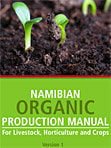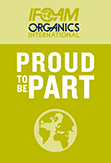World Food Day 2021
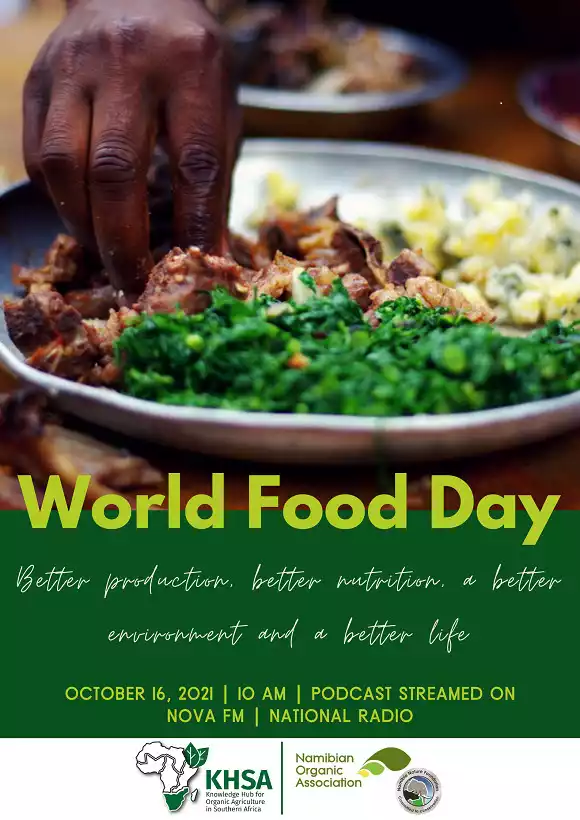
World Food Day (WFD) is celebrated every year all over the world with a view to paying tribute to the founding date of the Food and Agriculture Organization (FAO) of the United Nations in 1945.
In honor of WFD, the Knowledge Hub for Organic Agriculture in Southern Africa @KHSA and the Namibia Nature Foundation @NNF, together with the Namibian Organic Association @NOA, will be releasing a panel discussion on how organic agriculture can improve nutrition security in Namibia on 16 October 2021. See poster for details and tune in!
In addition, we hereby invite you to take part in the WFD competition:
Take a video or a photo of yourself in your garden or your most nutritious meal and post on Facebook and Instagram, don't forget to tag us.
Two lucky winners with the most liked post will walk away with a hamper. Competition runs from 21 September - 15 October 2021.
https://www.instagram.com/p/CUDMqgpNI7-/
https://www.facebook.com/namibiaorganic/videos/599114521108114
Winners to be announced on WFD, 16 October 2021.

September-October-updates
NOA hosted a Seed Saving Workshop on 5 October, facilitated by Dr Lydia Horn from the Namibian Institute of Seeds and the University of Namibia. Participants were very engaged throughout the day and learned the basics of saving seeds, such as choosing the right plants, harvesting, and storing seeds to keep them healthy. The workshop provided helpful tips on sustainable practices and taught practical skills for protecting plant diversity. Through engaging talks and demonstrations, participants left feeling confident about saving and storing seeds and supporting local ecosystems and future generations. The positive feedback highlighted how enjoyable and useful the workshop was!
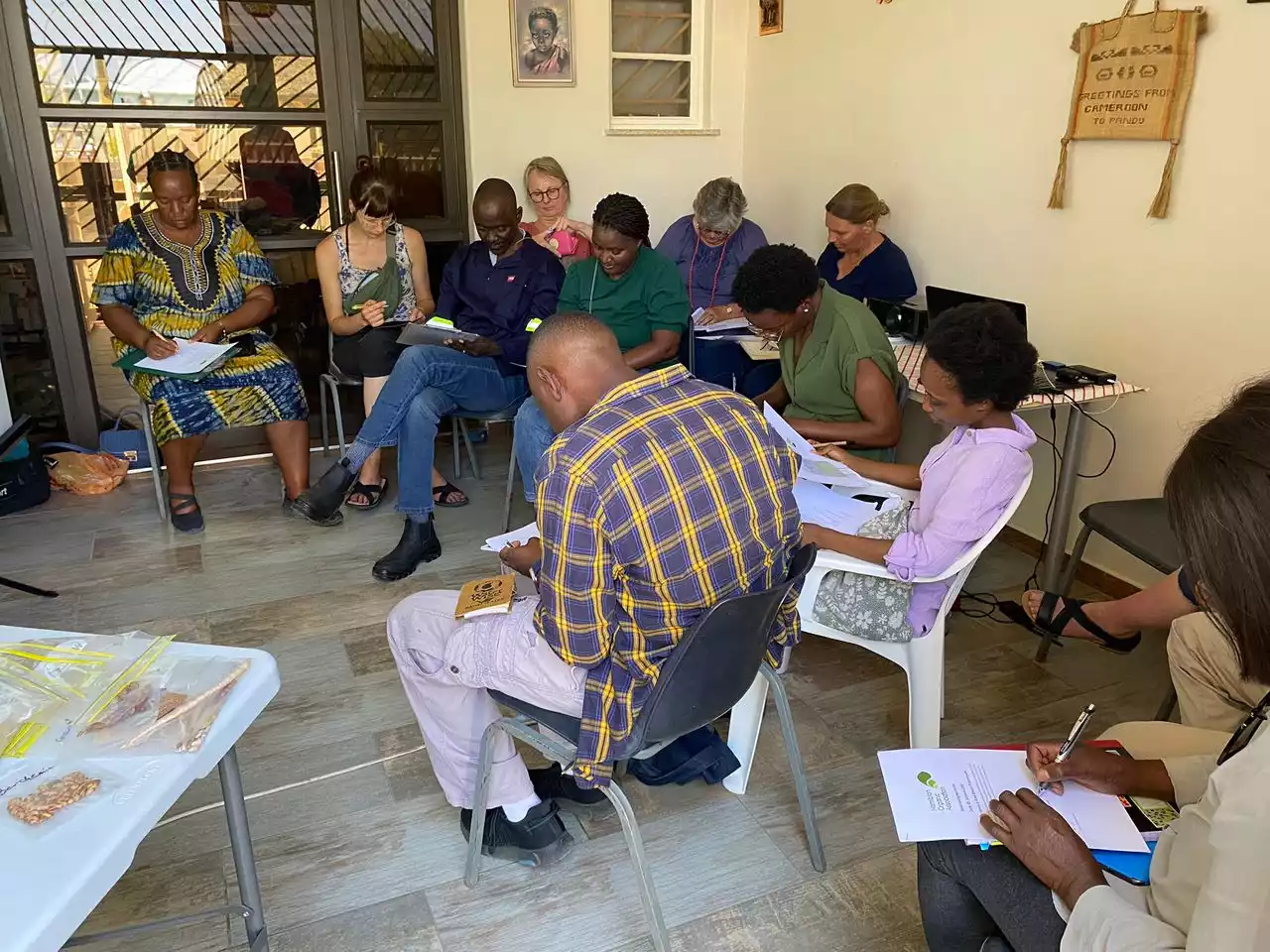
NOA AGM
The Namibian Organic Association (NOA) held its Annual General Meeting (AGM) on 17 October at the NNF offices in Windhoek. Both NOA members and non-members attended, with members making up the majority. Mareike Voigts presented the Chairperson’s report, sharing what NOA has achieved over the year, including partnerships with other organizations. Vera Corry presented the work of the Knowledge Hub on Organic Agriculture and Agroecology in Southern Africa (KHSA), which has now come to an end. The meeting ended with nominations for the new Board. Selma Nasheya, Vera Corry, Eckhart Förtsch, and Dirk Bockmühl were re-elected, while Lydia Nakupanda and Immo Böhm joined as new Board members. Sanet Brundyn, a long-term Board member, has stepped down from the NOA Board. The NOA Board would like to express their appreciation for all her long-term service and support to NOA and the organic sector in Namibia.

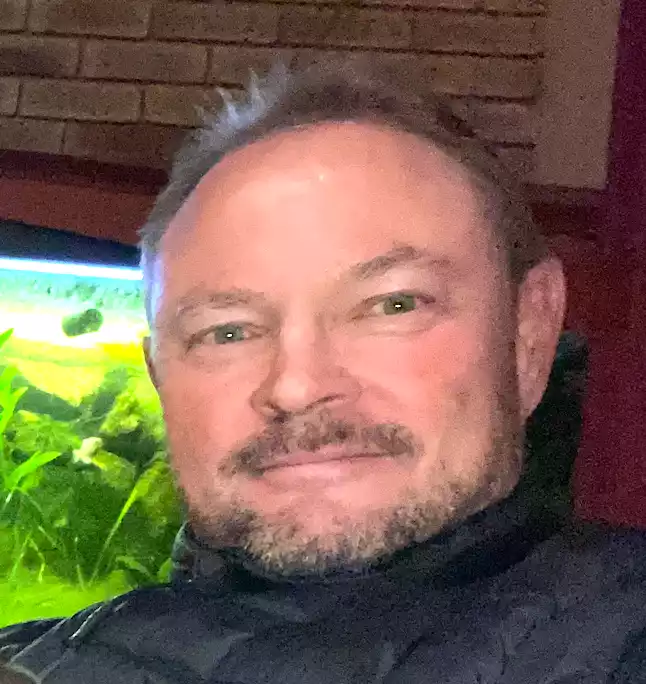
Lydia Nakupanda Immo Böhm
Training of Trainers for Organic Livestock Production
NOA and NNF hosted the Organic Livestock Training of Trainers workshop on Farm Krumhuk on 22 – 24 October. The training was attended by 6 trainers (representing freelance, Agribank, Ministry of Agriculture, Water and Land Reform), three of them also being livestock farmers themselves. The focus of the training was on sharing information with trainers on the technical knowledge for organic livestock production (including the validation of the content of the organic livestock training manual) as well as on how to facilitate such training with farmers, focusing on developing conversion plans from conventional to organic production. Participants found the training extremely engaging and useful, especially aspects of formulating the four principles of organic agriculture into practical examples. The training was co-facilitated by Eckhart Förtsch (NOA-certified organic vegetable and livestock farmer) and Jozua Lambrechts (holistic manager and farmer with a background in adult education).
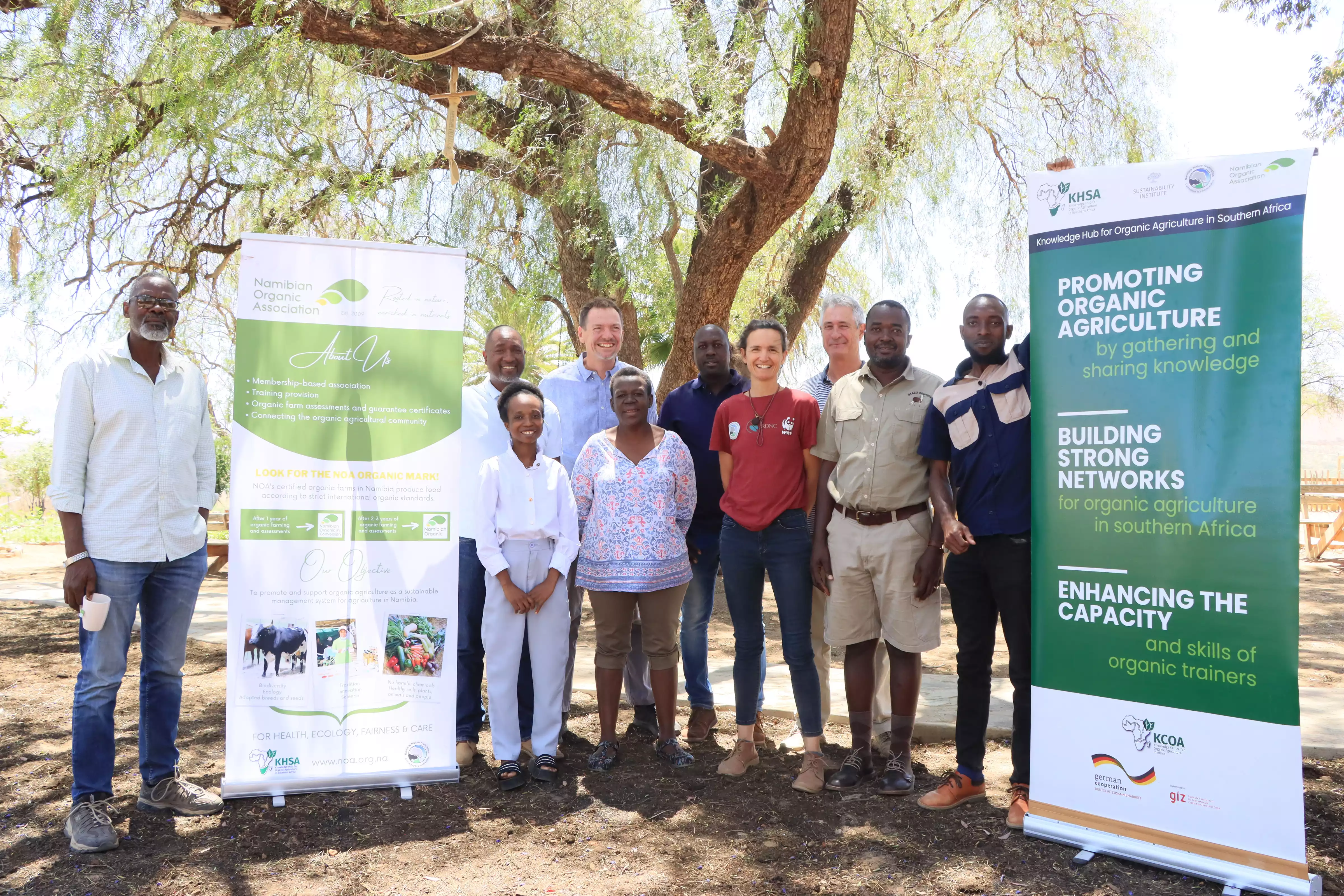
Home Gardening Workshop
Join us for the Home Gardening Workshop on Saturday, 7 December 2024!
Learn how to assess your space, plan layouts, manage water effectively, and participate in hands-on activities focused on soil preparation.

Call for comment on Biosafety Regulations
Call for comment on Biosafety Regulations
The first meeting of the Biosafety Council will be held on 10 October 2014 during which the Terms of Reference for the Board and the Regulations will be discussed. Currently the Regulations make provision for the following aspects of biosafety:
- the first set of Regulations are about GMO’s in food, fodder and processing;
- the second set of Regulations are about GMO’s which are released in the environment; and
- the third set of Regulations are about GMO’s in laboratories.
Public consultations will still have to take place.
It is hoped that the Biosafety Act will be implemented latest during 2017.
Release: 22.09.2014
NOA Course 2020: Introduction to Organic Vegetable Gardening
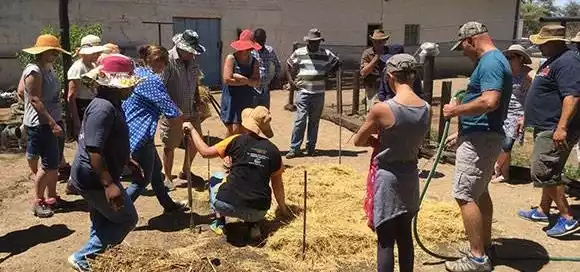
NOA Course 2020: Introduction to Organic Vegetable Gardening
Is your garden ready for summer? The Namibian Organic Association (NOA) invites you to attend a training course on growing your own organic vegetables. You will learn about basic composting techniques, how to use earthworms to fertilise your soil, how to save water, what to plant when and how to control pests and diseases.
Dates: The course will be held on Sat 28 Nov 2020
Venue: Farm Krumhuk, 25km south of Windhoek on the B1 (accessible with a sedan car)
Time: 7:30 for 8:00 am - 17.00 pm
Cost: N$750 per participant; N$650 for NOA Members
The course fee includes a light lunch, refreshments, and two coffee breaks with snacks
Presenters: Dirk Bockmühl, Mareike Aufderheide-Voigts, Eckhart Förtsch
Seats are limited so please e-mail us to register info@noa.org.na
NOA Course 2021: BioChar Production
"Increase your soil fertility with BioChar production."
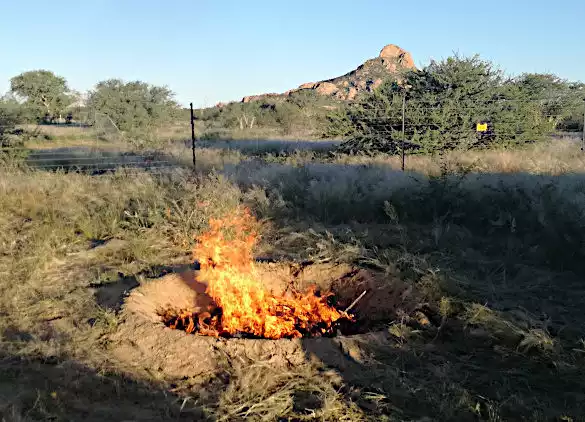
The course will be held at Farm Krumhuk, 20Km outside Windhoek
Date: Saturday, 11 September 2021
Time: 08:00 - 16:00
Fee: 790 non-members, 690 NOA members
Seats are limited so please e-mail us to register info@noa.org.na
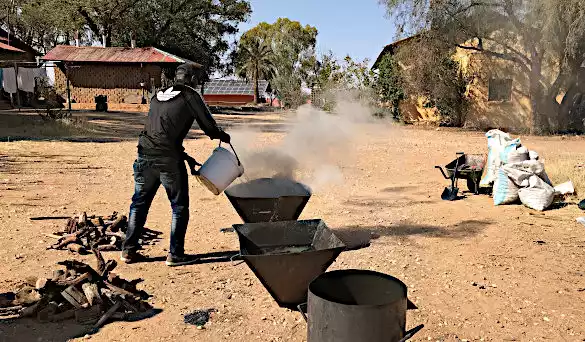
Fruittree Care and Planting Course
Dates: Saturday, 21 August 2021
Venue: Finkenstein (outside Windhoek)
Time: 08:00-16:00
Cost: N$750 per participant; N$650 for NOA Members
The course fee includes lunch and two coffee breaks
Presenter: Freddy Beukes from Wolwedans Desert Academy
Seats are limited so please e-mail us to register info@noa.org.na,
The "Fruit Tree Planting and Care" course covers the following topics:
Selection of types of fruit trees and suitable sites before planting
Preparing the soil organically and how to plant the tree
Difference between own rooted trees and grafted trees
First year care of a new tree
Proper pruning and trimming
Pests, diseases and organic remedies
The course will have parts of theory and practical sessions.
July-August-updates
On 20 July, NOA held its first training on Bokashi fertilizer making, facilitated by Christie de Wet, with 17 participants in attendance. Christie comprehensively explained Effective Microorganisms (EM) and Bokashi, highlighting their benefits to soil health and fertility. The training included theoretical and practical components, where participants gained a deeper understanding of how soil works and the importance of EM in agriculture. They also participated in a hands-on demonstration of producing Bokashi fertilizer, which can be added to compost to accelerate decomposition, offering a practical solution that is quick and efficient to implement.
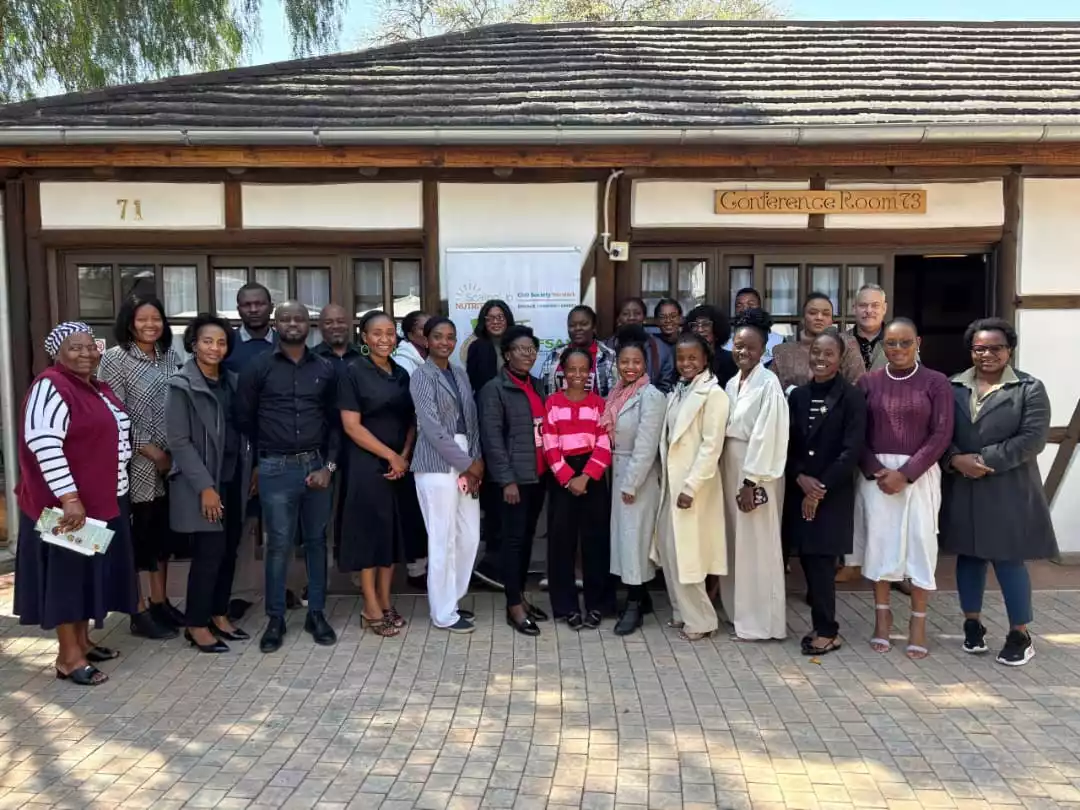
Environmental Assessment for Genetically Modified Maize Cultivation
The Namibian Organic Association (NOA) has registered as an interested and affected party in the upcoming environmental assessment for agricultural activities related to the environmental release of genetically modified (GM) maize for cultivation in the Oshikoto and Otjozondjupa regions.
In line with the NOA’s ongoing commitment to promoting sustainable and organic agriculture in Namibia, the NOA is awaiting final decisions and further information on this assessment to better understand its scope and potential environmental impacts.
Organic Agriculture and Agroecology Conference
The Namibian Organic Association, in collaboration with the Namibia Nature Foundation through the KHSA project, hosted a two-day conference on organic agriculture and agroecology from 28-29 August 2024 in Windhoek. The event brought together various stakeholders from the agricultural and food sectors in Namibia and abroad.
The conference aimed to enhance understanding of organic agriculture and agroecology while highlighting the opportunities these practices offer to Namibian farmers, to the agricultural sector, and a transformation of the food system as a whole. Discussions focused on the challenges facing the sector, including climate change, the current food system, and the policy environment, while exploring the solutions and opportunities that organic agriculture and agroecology can provide. The conference also brought attention to the establishment of the Technical Working Group on Organic Agriculture and Agroecology Strengthening (TWG-OAAS) by the Ministry of Agriculture, Water and Land Reform, NOA, and the NNF, and concluded with identifying key stakeholders that should be nominated for serving on this TWG through a participative stakeholder engagement process.

Fruit Tree Management Training
On 31 August, the Namibian Organic Association (NOA) hosted a 1-day Fruit Tree Management course in Windhoek, attended by 14 participants, and facilitated by Wolfgang Schenck. The training offered valuable insights and hands-on demonstrations on essential techniques for nurturing healthy fruit trees.
Key topics covered during the workshop included pruning techniques, best practices for planting new trees with organic matter, and the proper application of fertilizers—highlighting when and what to use. Participants also learned effective strategies for tackling common pests that threaten plant health. A central theme of the workshop was the importance of good soil, reinforcing the idea that "good soil can have strong plants." The session had a practical demonstration of tree planting, emphasizing the importance of a solid foundation for sustainable growth. A big thank you also goes to Trees For Africa for supporting the workshop with some extra trees for demonstration purposes.
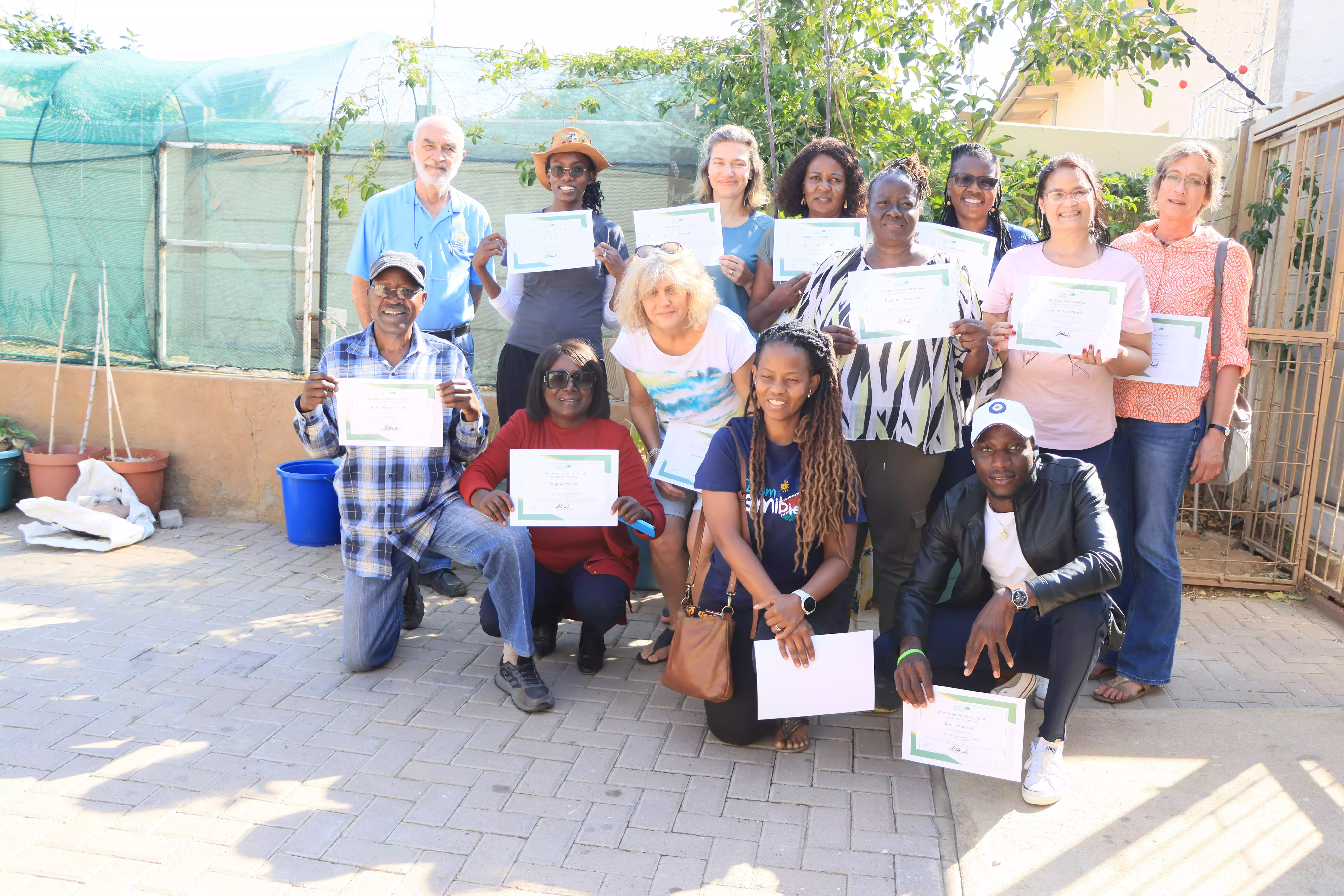
World Board Approves IFOAM – Organics International's 2024-2034 Strategy
The World Board of IFOAM - Organics International has approved a forward-thinking 10-year strategy to unify the global organic community and highlight organic agriculture as a crucial solution to today's global challenges, including climate change, biodiversity loss, food security, and social inequality.
To learn more about this strategy, please click here to check it out.
Visit Farm Springbockvley and Judith Isele
A field trip to a winning farm on 9 March 2016
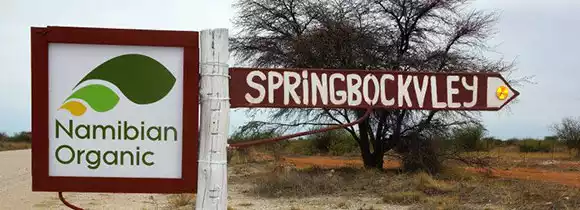
Join NOA on a field trip on 9 March 2016 to Farm Springbockvley to meet Judith Isele, winner of the 2015 Young Farmer of the Year Award, and NOA Vice-Chairperson, and discover how she puts into action organic agricultural principles in a sustainable and profitable manner.
Download the full programme for 9 March here...
Download the Landbou Weekblad profile of her operation here...
Download the registration for for the field trip here...
May-June-updates
Over the past two months the KHSA team focused on finalizing the knowledge products that have been under development based on needs assessments other stakeholder engagements. Over 74 knowledge products on organic agriculture and agroecology have been developed under the sector-wide activities and the Multiplier Support Program, with most being validated by stakeholders (multipliers) involved such as commercial livestock farmers, emerging livestock farmers, university students and lecturers, media partners, and small-scale farmers. The final knowledge products were informed by needs assessments conducted with these stakeholders to determine their specific needs with regard to organic agriculture and agroecology. These will be made available on the NOA website for anyone to view and download.
Interested in organic livestock production?
NOA has been developing a series of seven short informative videos on the key aspects of organic livestock production, with input from farmers in the country who are practicing according to organic farming principles. The videos give short introductions to topics such as animal welfare, adapted breeds, feeding organic livestock and organic markets, which play a central role in the management of organic livestock, as well as capturing these farmers’ personal and experiences with regard to livestock farming. The series of informative livestock videos on organic livestock, filmed in March and funded through the KHSA project implemented by NOA and NNF, will be released over the next few weeks on Livestock videos
Effective Microorganisms and Bokashi composting
NOA will kick off its first training of the year with a training on Effective Microorganisms (EM) and Bokashi on 20 July 2024 in Windhoek, facilitated by Christie de Wet. Bokashi, a fermented compost, has advantages for sustainable solutions in enhancing soil health, managing organic waste and promoting eco-friendly practices in agriculture and gardening. Come join NOA for a deep-dive into EMs and bokashi-making for improving soil health! For more information, please contact us at info@noa.org.na.
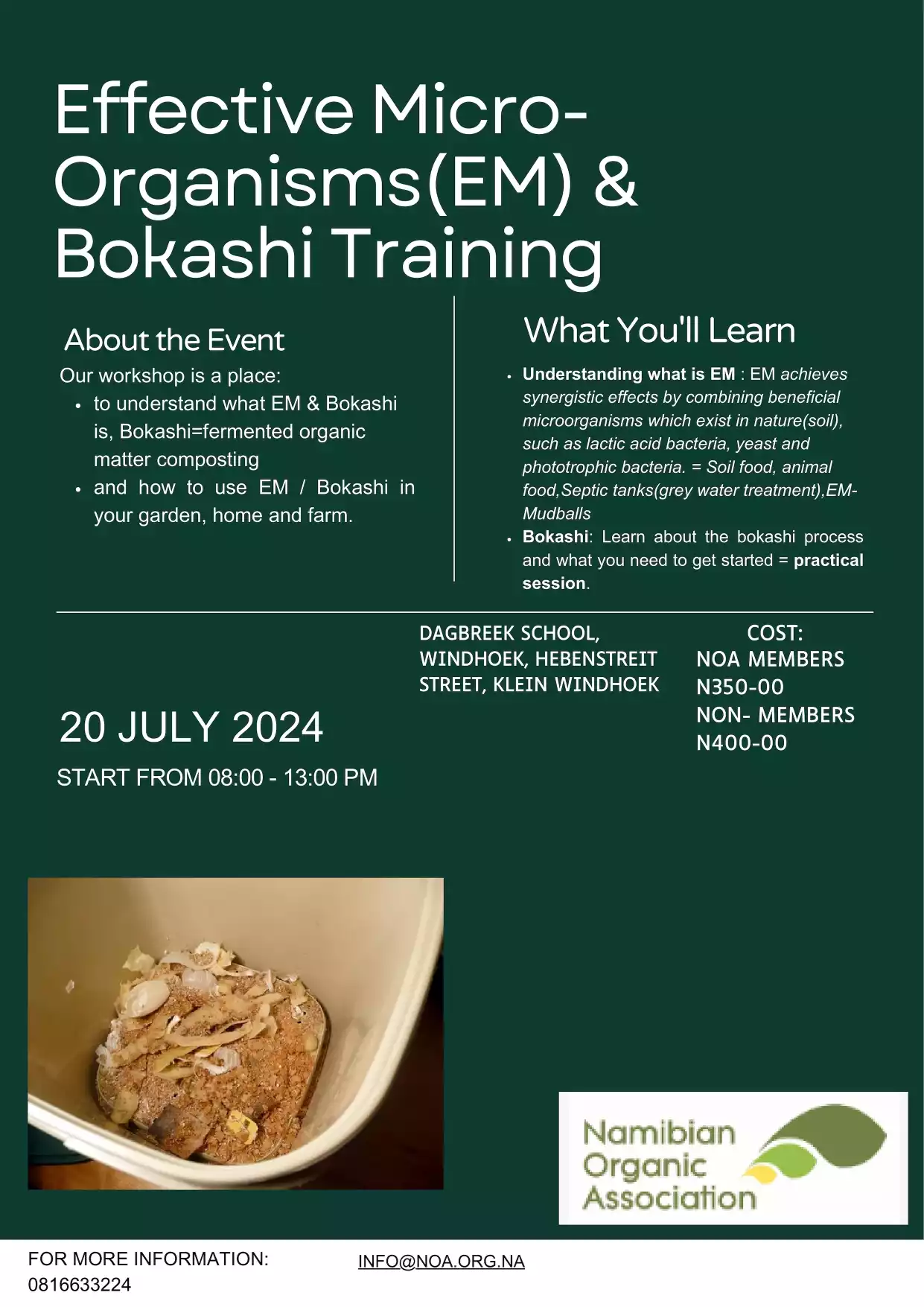
Zambia's 1st Agroecology Conference
The agroecology conference held in Zambia on May 21, 2024, aimed to gather evidence on agroecological practices, create awareness, promote the adoption of agroecology, and influence policy changes in the food system. It brought together researchers, practitioners, farmers, women and youth-led organizations, policymakers, the private sector, civil society organizations, donors, and other interested groups in agriculture and agroecology. The conference provided a platform for cross-learning, knowledge sharing, and discussions on the challenges facing the food system and how agroecological interventions can mitigate negative impacts. It also outlined policy options to create an enabling environment for the promotion and popularization of agroecology on a large scale. Check out the SA organic news for more information.Organic news
NOA attends AU training
NOA attends AU training
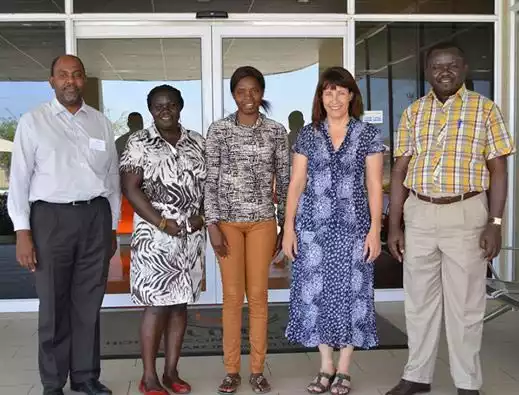
Organic training for the future of Namibian agriculture. A Namibian Organic Association (NOA) recently attended an AU course on organic agriculture. Pictured FLTR are John Mufikidza (NOA), Diana Akullo (AUC), Martha Nataneal (NOA), Manjo Smith (NOA), Jonathan Ocran (AUC).
The Namibian Organic Association (NOA) recently attended the Regional Training Workshop on Marketing and Extension support to organic farmers and practitioners. The workshop, organised by the African Union, was held in Gaborone, Botswana.
Talking about the value of the course, NOA Chairperson Manjo Smith said there is high demand in Namibia for organic agricultural produce as people prefer food that is healthy, nutritious and free from harmful pesticides or Genetically Modified Organisms (GMOs). She said however that demand exceeds supply, so there is a need to strengthen organic capacity in the agricultural sector. She said that training opportunities are invaluable in this regard.
In addition to providing training on organic farming operations, the workshop covered natural management techniques for pests, marketing of produce and compliance with organic standards.
Said AU Department of Rural Economy and Agriculture Policy Officer, Jonathan Nyarko Ocran, development of organic agriculture is a component of the 2014 AU Year of Agriculture and Food Security. Ocran said the programme also marks the 10th anniversary of the Comprehensive Africa Agriculture Development Programme (CAADP).
CAADP, a flagship programme of the African Union encourages AU members to allocate at least 10 percent of their total public expenditures to agriculture. Currently, 50 of the 54 AU countries use the CAADP framework to develop their agriculture.
Ocran said that organic and near-organic agricultural methods and technologies are ideally suited for many poor and marginalized smallholder farmers, as they require minimal or no external inputs and also use locally and use naturally available materials to produce high-quality products.
He said research by the United Nations Environment Programme (UNEP) shows that organic agriculture outperforms traditional and chemical-intensive methods of farming. He also said organic agriculture provides more public good than any other type of farming.
John Mafukidze, Director and co-founder of Hope Initiatives Southern Africa – Namibia, said the training was a full package with well presented information, that addressed some of the best practices in organic agriculture, and innovative, easy methods of managing pests.
Martha Natanael who was also among the Namibian delegation added that she left with the ability to start her own organic farm, and that she also learned a lot from Zimbabwean and Zambian participants involved in organic agriculture.
Currently, 2,400.00 hectares are certified organic in Namibia through 3rd party certification and 23,079 hectares through the Namibian Organic Association’s Participatory Guarantee System (PGS).
March-April-updates
The NOA and NNF team have been filming, compiling, and editing a series of short informative videos on organic livestock production principles. Each video focuses on different aspects of organic livestock management, starting with an introduction to organic agriculture and the health benefits of organically grown food, then delving into animal welfare, adapted breeds, sustainable grazing practices, feeding organic livestock, and organic market opportunities. Stay tuned for the launch of the videos on NOA’s social media sites!
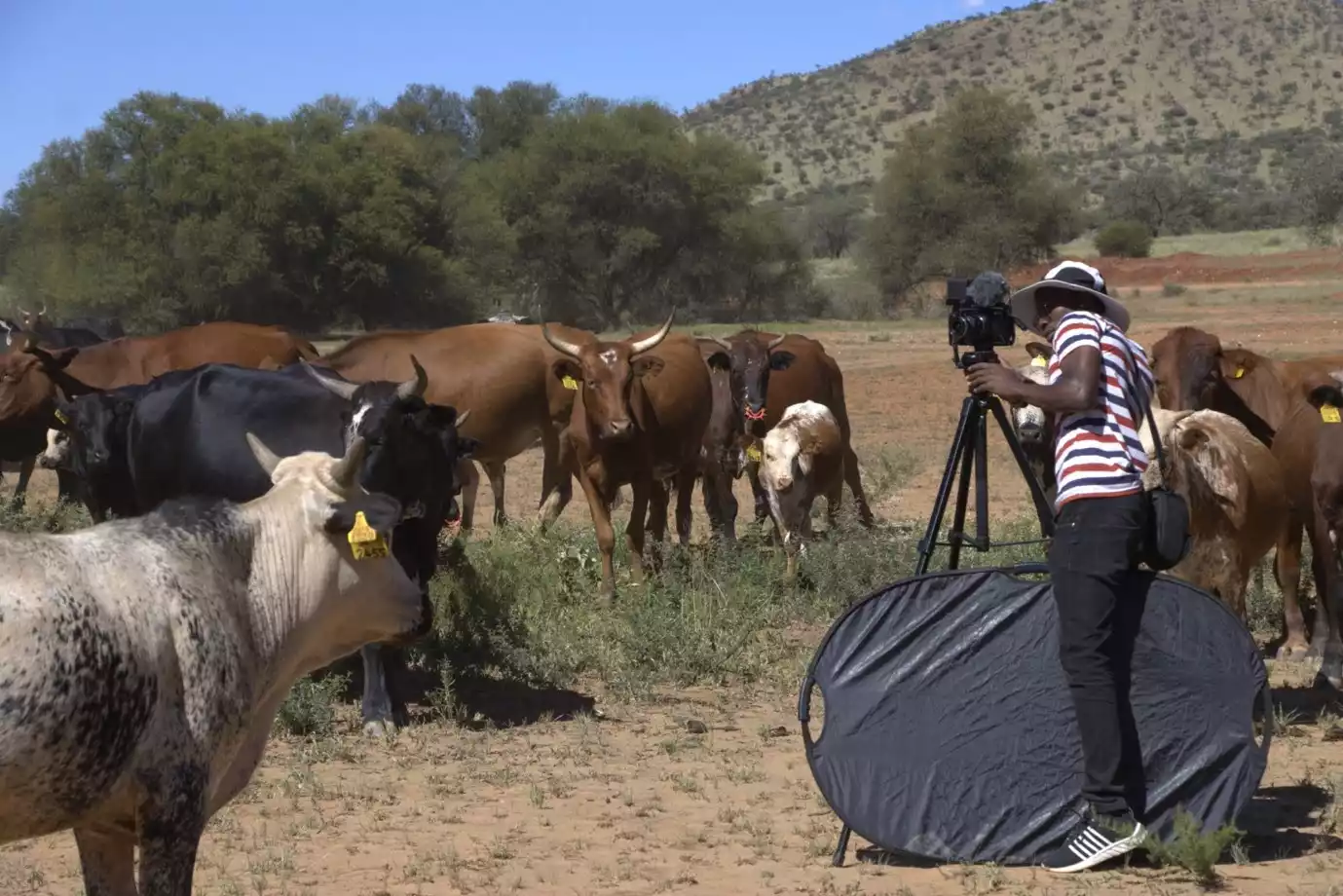
ERASMUS and Agricultural Vocational Training in Namibia.
The Namibian Organic Association was among the guests at the launch of the Erasmus+ funded project, aimed at 'Strengthening the Agricultural Sector through Agricultural Technical and Vocational Education and Training' in Namibia. This project intends to enhance Namibia's agricultural landscape by developing training material for the two additional vocational agricultural management qualifications (L4 and L5) for national ATVET training providers. These qualifications have been developed, but are currently not being taught in Namibia, The launch ceremony was attended by the Managing Director of DAPP Namibia, the EU Ambassador, the Acting Deputy Executive Director for Research, Innovation, and Training, the General Manager of TVET Regulations at NTA, as well as relevant stakeholders and representatives from vocational training centers and other organizations.
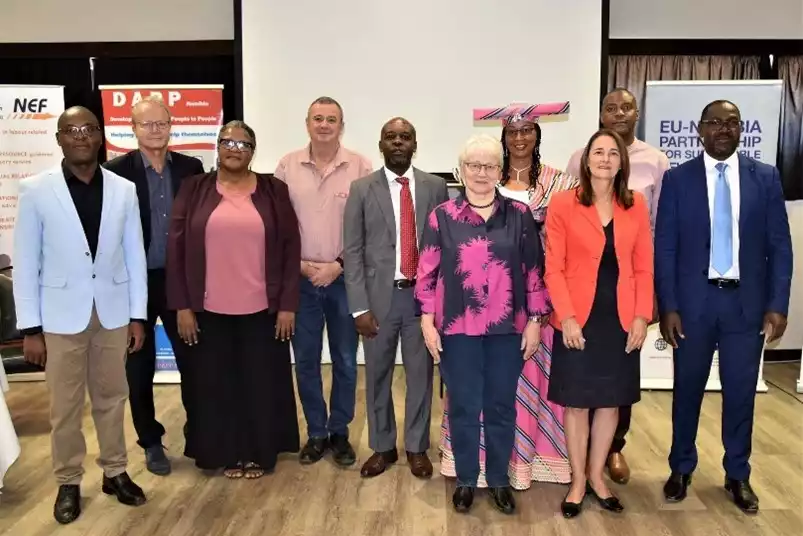
Planting calendars:
Embrace the winter chill with the perfect garden companion.As we approach or already find ourselves in winter, it's time to prepare for the season ahead. Our essential planting calendar equips you to master the challenges and opportunities of winter gardening. Designed as your trusted guide, it provides invaluable insights into which plants flourish during this time, ensuring your greenery thrives despite the cold. Let our planting calendar be your companion on this gardening journey, helping you cultivate a vibrant and resilient garden throughout the winter months and beyond. For info please reach us at info@noa.org.na
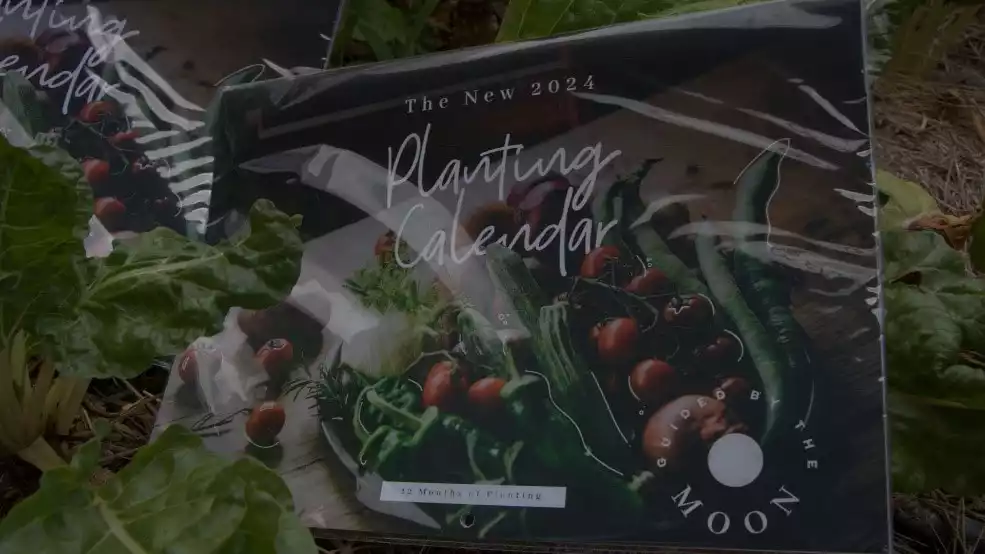
Successful Harvest of Potato Varieties – Seed access facilitated through NOA
A NOA member, Amanda Viviers, proudly celebrates a bountiful harvest from her humble beginning with Tyson and Panamera potato seeds provided by NOA. With each potato sold, Amanda not only contributed to her financial sustainability but also supported sustainable agriculture. She reaped over 200kg of high-quality produce.
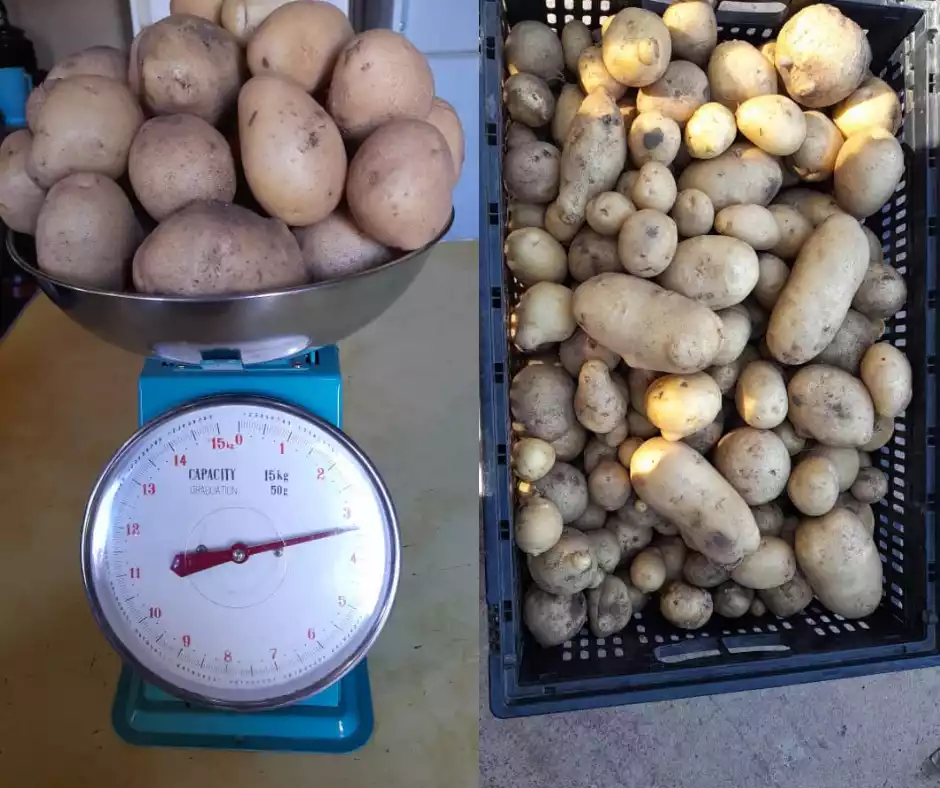
Biosafety Council appointed
Biosafety Council appointed
A Biosafety Council was appointed in July 2014 which falls under the National Commission on Research, Science and Technology.
The Council comprises of Dr Herbert Schneider (animal health and welfare), Mr Teofilius Nghitila (environmental matters), Dr Ronnie Bock (public health and food security), Dr Martha Kandawa-Schulz (molecular biology), Etuna Josua (legal matters), Ms Caroline !Garus-Oas (research, science and technology) and Simana Chimana (trade and economy).
An administrative unit with 3 staff members was also created. A Registrar will also have to be appointed.
The first meeting of the Biosafety Council will be held on October 10, 2014 during which the Terms of Reference for the Board and the Regulations will be discussed.
Release: 22.09.2014
Important Dates
EVENTS CALENDAR
Announcement: Organic Association and Namibian Nature Foundation launch programme to boost organic agriculture in Namibia
Programme activities will be delivered through the Knowledge Hub for Organic Agriculture in Southern Africa
[WINDHOEK, NAMIBIA, 01 February 2021]
The Namibian Organic Association (NOA) and the Namibia Nature Foundation (NNF) launched country activities for the Knowledge Hub for Organic Agriculture in Southern Africa (KH SA) that aims to promote the adoption and scaling-up of organic agriculture in the region.
Mareike Aufderheide-Voigts, Namibian Project Manager, who holds a degree in B.Sc Organic Agriculture and M.Sc. Sustainable International Agriculture from the University of Kassel, Witzenhausen, Germany, notes that “introducing organic agriculture practises to Namibia’s agricultural system will help the country combat climate change, rejuvenate agricultural soils, reduce agricultural water usage and produce nutrient-dense food.”
KH SA is a collaborative country-led partnership funded by the German Federal Ministry of Economic Cooperation and Development (BMZ) and implemented by the Deutsche Gesellschaft für Internationale Zusammenarbeit (GIZ) GmbH. It is one of five Knowledge Hubs for Organic Agriculture, under the Knowledge Centre for Organic Agriculture in Africa programme, pursuing the goal of disseminating knowledge and shaping a network on national, regional and continental levels. The other four Knowledge Hubs for Organic Agriculture are implemented by GIZ in North, West and Eastern and Central Africa. KH SA is operating in Zambia, Namibia and South Africa with plans to extend the project to Malawi in 2021. The South African-based Sustainability Institute provides support for the regional project. NOA and NNF lead project activities in Namibia.
KH SA aims to close the knowledge gaps that limits the sharing of organic agriculture production methods in Southern Africa. Namibian project activities aim to grow the number of organic growers and volume of organic food produced in the country. The project will further be supported by the development of an online platform to disseminate context-specific knowledge about organic farming in Africa.
“Organic agriculture in the Namibian context refers to an inclusive approach to certified and non-certified organic agriculture production systems such as conservation agriculture; regenerative, biodynamic, biological and ecological farming; permaculture, agro-ecology and agroforestry systems, as well as climate smart and climate resilient production systems,” states NOA Chairperson Eckhart Foertsch.
Organic food production is increasingly viewed by international organisations such as the United Nations as a strategic way to address challenges of rural poverty, malnutrition, biodiversity loss, particularly in a time of climate change. The United Nations Children's Fund notes that 25% of children under five years of age in Namibia are stunted and that malnutrition is widespread in the country. Organic agriculture can be a pathway to addressing not only hunger and malnutrition but also other challenges including poverty, water use, climate change, and unsustainable production and consumption.
“Organic agriculture is knowledge-intensive, and putting it into practice requires an in-depth understanding of soil fertility, natural cycles and interactions between soil, microorganisms, plants and livestock” says Aufderheide-Voigts. The KH SA project will help by gathering and sharing information with Namibian farmers to allow them to benefit from practices that are environmentally friendly and sustainable.
This collaborative partnership is important for long term sustainable socioeconomic development in Namibia, which depends to a great extent on the use of sustainable organic agricultural practices, both now and in the face of climate change. NNF and NOA are able to make significant contributions to such development through partnerships in education, training, research and extension activities.
"If you are passionate about nature then first and foremost you need to respect people. And in Namibia, for a large part of the population that means also respecting agriculture in rural areas and what we aim to do is strive for more productive landscapes that produce food and natural resources and at the same time maximise on the ecosystem services that benefit wider society. This collaboration between the NNF and NOA is a stride our organizations are profoundly proud of. The Namibian agricultural landscape continues to develop at an amazing rate and an initiative like this that equips farmers with the skills to practice more sustainable agriculture is of utmost importance. I am optimistic we will see more practices and methods used in farming with and not against nature,” Angus Middleton, Executive Director of the Namibia Nature Foundation.
The next step in the project is to engage stakeholders and ensure that their recommendations are considered in project implementation. Engagements will take place online and face-to-face, COVID-19 regulations permitting. Aufderheide-Voigts notes that “we look forward to active participation in order to really grasp the needs of the sector here in Namibia.”
For more information about the Namibian implementation of KH SA contact: Mareike Aufderheide-Voigts, Country Project Manager, Tel: 081 722 5378, Email: noa@nnf.org.na.
For more information about KH SA contact: Angela Coetzee, Project Director, Sustainability Institute, Tel: +27 (0)21 881 3500, Email: angela@sustainabilityinstitute.net
Training course: Introduction to Organic Vegetable Gardening
Saturday, 28 Nov 2020
Is your garden ready for summer? Join Saturday's training course and start growing your own organic vegetables!
You will learn about basic composting techniques, how to use earthworms to fertilise your soil, how to save water, what to plant when and how to control pests and diseases.
Venue: Farm Krumhuk, 25km south of Windhoek on the B1 (accessible with a sedan car)
Time: 7:30 for 8:00 am - 17.00 pm
Cost: N$750 per participant; N$650 for NOA Members. The course fee includes a light lunch, refreshments, and two coffee breaks with snacks
Presenters: Dirk Bockmühl, Mareike Aufderheide-Voigts, Eckhart Förtsch
Register: Seats are limited so please e-mail us to register info@noa.org.na
NOA's Annual General Meeting
Wednesday, 2 Dec 2020
Join NOA’s Annual General Meeting on Wednesday, 02 December 2020. NOA members will get feedback on the past year and are welcome to give input into future activities. New members can join before the start of the AGM to participate in voting and other official matters.
Time: 17h30 for 18:00 pm - 20:00
RSVP: Please confirm attendance by e-mail info@noa.org.na or WhatsApp 081 663 3224 for catering purposes.
A donation bar is available.
January-February updates
The guest lectures that were hosted by NOA and the Namibian University of Science and Technology (NUST) in September to November 2023, are now available for viewing on NOA’s YouTube channel! The series of guest lectures was part of the KHSA sector-wide activities around raising awareness and sharing knowledge on organic agriculture. Read a summary of the guest lectures in the latest edition of the ISAN magazine. ISAN, short for IFOAM Southern African Network, is a network of organizations and individuals actively supporting the development of a sustainable, ecological, organic agricultural sector in Southern Africa.
Follow the links here to view each guest lecture:
The relevance of organic farming for the future-- https://youtu.be/MH4N4oJj9lo
The Food Challenge-- https://www.youtube.com/watch?v=NvXvnMBWuPk
Adding life to soil--https://www.youtube.com/watch?v=e8tfSACscck
Pest and Disease Management in organic agriculture--https://www.youtube.com/watch?v=CvRrACW7egk
Beyond production-https://www.youtube.com/watch?v=LV9u2vYhx2g

Zambezi Region Training Program Update
We're excited to share the latest developments from our 8-month-long training program in the Zambezi region. In early February 2024, we introduced newly designed training materials aimed at enhancing small-scale farming productivity, resilience, and sustainability. The facilitator team has crafted informative posters showcasing various techniques to uplift small-scale farming. These posters serve as visual aids, illustrating methods to make farming more productive, resilient, and sustainable. Participants, already well-versed in these techniques, had the opportunity to engage with the posters, providing valuable feedback for further enhancement. These insights are invaluable in ensuring these resources meet the needs of our farming community!
Once finalized and colored, these posters will be made available on our website and other channels. Stay tuned for easy access to these educational materials, empowering you to implement effective strategies on your farm.
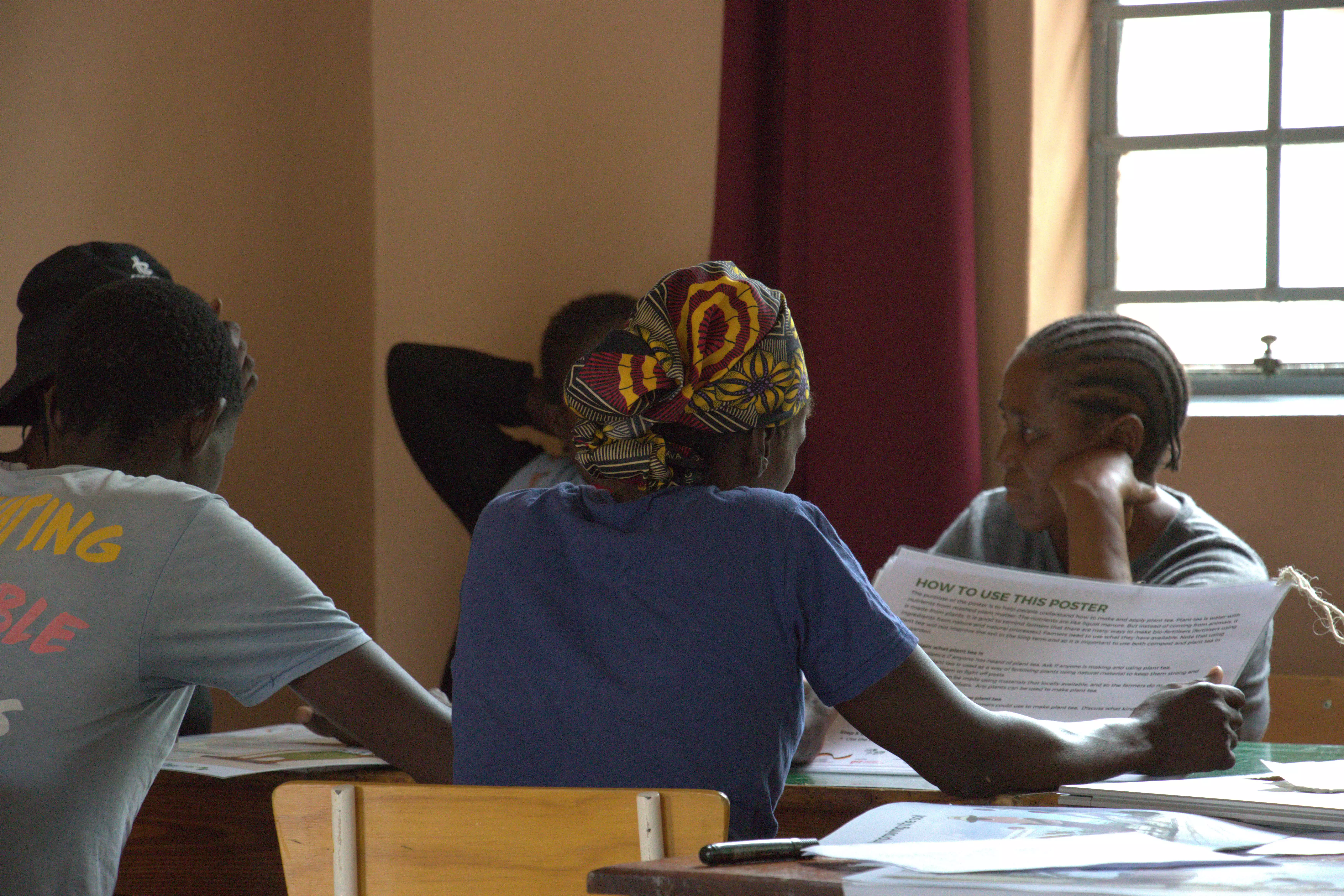
Project planning meeting for KHSA 2024
In January, NOA, the Namibia Nature Foundation (NNF), and the Sustainability Institute (SI) held a planning meeting regarding project activities under the Knowledge Hub on Organic Agriculture and Agroecology in Southern Africa (KHSA), with a focus on finalizing several knowledge products and planning activities for the year ahead leading into a close-out period for the project towards the end of 2024. The project activities have been focused on sector-wide activities country-wide and the Multiplier Support Program (MSP) in the Zambezi region. Sector-wide activities aim to strengthen relationships among relevant stakeholders across the agricultural sector in Namibia and to facilitate the sharing and dissemination of information on organic agriculture and agroecology. The MSP has prioritized enhancing multipliers' capacity to effectively convey information on organic agriculture and agroecology, to build the capacity of small-scale farmers.
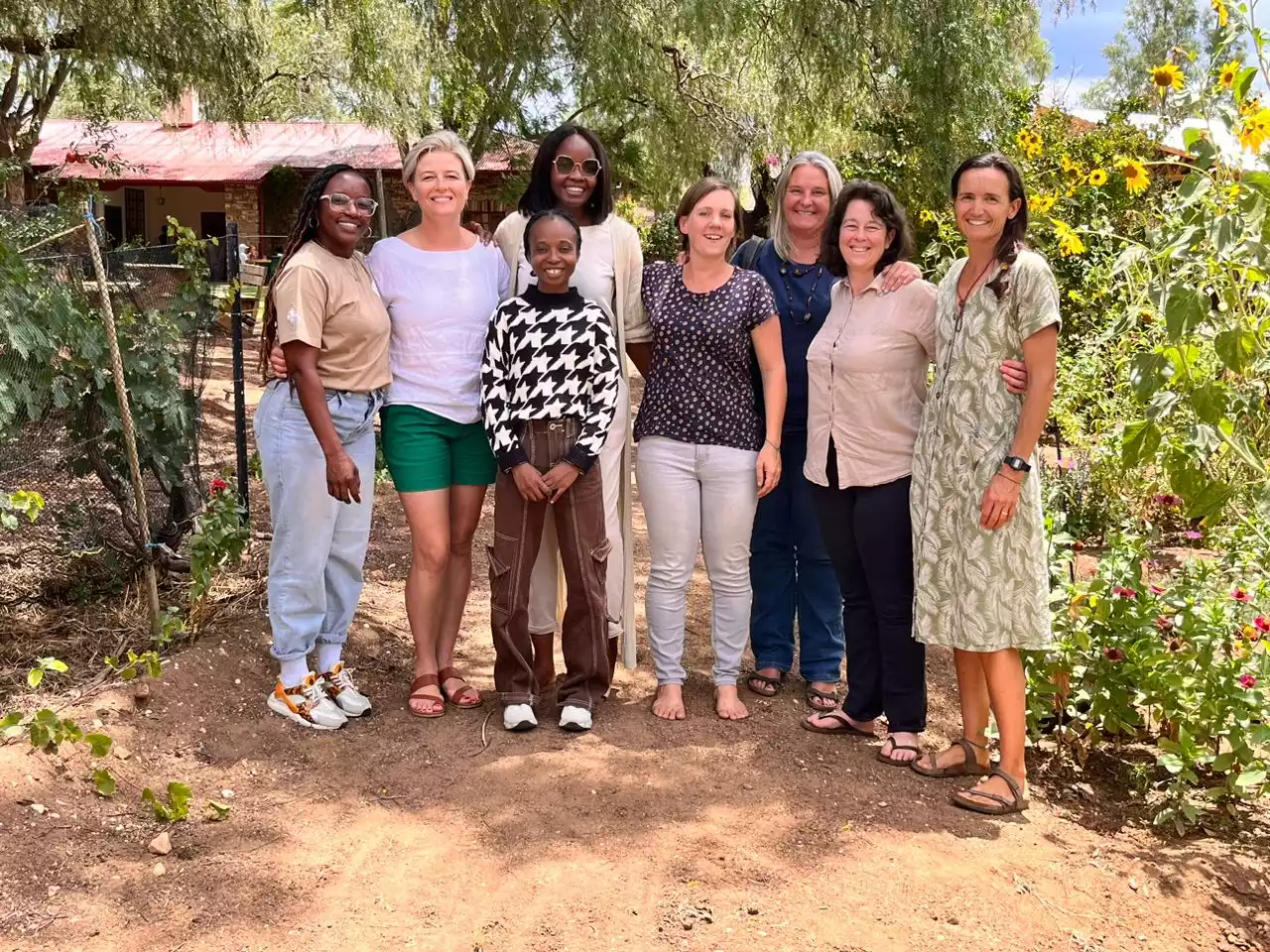
NOA attends African Organic Conference, Zambia
NOA attends African Organic Conference, Zambia
Six members of the Namibian Organic Association attended and made presentations at the 2nd African organic Conference, held in Zambia from 2 – 4 May 2012. The purpose of the Conference was to highlight the importance of organic agriculture in Africa and to set an agenda whereby organic agriculture takes centre stage and gets its rightful recognition as a tool for inclusive and sustainable development on the continent.
The theme of this year’s Conference was “Mainstreaming Organic agriculture in the African Development Agenda”. It focused on the economical, social and environmental contribution that organic practice makes toward the development and sustainability of food production and food security on the African continent.
Honourable Emmanual T. Chenda, MP< Minister of agriculture and livestock in Zambia said in his address, “Organic agriculture is one of the best practices in ensuring environmental sustainability. It sustains the fertility of soils, ecosystems and sustains the health of people. It relies locally adapted, improved ecological processes and cycles, and natural biodiversity rather than the use of synthetic inputs and genetically modified materials. It is therefore important that our farmers are encouraged to practice organic farming. I have no doubt that organic agriculture has the potential to contribute to food security, increased incomes and generation of employment for our people.”
Mr Petko Draganov, Deputy Secretary General of UNCTAD aid, “UNCTAD research has shown that worldwide – and in Africa – organic farmers generally earn better incomes. Revenues are higher because of rapidly growing markets, as well as frequent price and quality premiums. For most African organic products, there is not enough supply to meet the demand.”
This is indeed good news for the organic community in Africa. He went on to say, “(The) combination of higher net incomes and varied nutritious food means that organic agriculture is good for food security. It is also more likely to be sustainable in the long term because the shift to organic farming serves to build human, social, natural, financial and physical capital in farming communities”. Major role players in the organic movement in Africa were present and included the African Union, the United Nations Conference on Trade and Development (UNCTAD), the International Federation of Organic Agriculture Movements (IFOAM) and the Food and Agriculture Organisation of the United Nations (FAO).
Dr Kenneth Kaunda, first President of the Republic of Zambia serves as the patron of the organic movement in Zambia and brings strong leadership to the organic movement in Zambia and the rest of the regions at a time when organic production takes centre stage in the agricultural sectors.
Namibians who addressed the Conference were:
- Mrs Manjo Smith who delivered a paper on Organic agriculture as a strategy for biodiversity and adaptation and mitigation to climate change. Smith is the first Namibian elected to the World Board of trhe IFOAM in 2011 and is Chairperson of the Namibian Organic Association,
- Wiebke Volkmann from the Namibian Centre for Holistic management did two presentations; “Principles and practices of holistic management and how these can and do support organic production in Namibia” and “Community based rangeland and livestock management as a multiple-benefit strategy for improving meat production with low external inputs”, and
- Judith Isele, Vice Chair of the Namibian Organic Association, who gave a presentation on “Facing the challenges of organic livestock production in Namibia with the help of holistic management”.
During his opening address, Draganov said, “We should all work together to increase awareness about organic agriculture and develop supportive policies and programmes to help it spread.”
A vital outcome of this conference is the establishment of the Southern African Network for Organic Development (SANOD), made up of the organic sectors from the Southern African countries for the purpose of working together at a regional level with the outcome of interacting at CAADP (The Comprehensive Africa Agriculture Development Programme) level. SANOD’s objective “is to lead and support the organic agriculture movement in the region, in order to promote trade, harmonising organic production standards, to address challenges and opportunities of mutual concern, and to facilitate organic production research”.
Manjo Smith of the Namibian Organic Association was elected as Chairperson. The rest of the steering committee are: Stanley Chidaya, Malawi organic Growers Association (Vice-Chair), Munshimbwe Chitalu, organic Producers and Processors Association of Zambia (Secretary); Heinrich Schultz South African Organic Sector Organisation (Treasurer), Fortunate Nyakanda, Zimbabwe Organic Producers and promoters Association (Additional Member).
300 delegates from 35 countries around the world attended the conference. For more information about the 2nd African Organic Conference in Zambia, visit www.africanorganicconference.com
Planting Calendars

We are excited to present our planting calendars, crafted to enhance your gardening or farming activities. If you wish to learn more about when to plant and harvest crops, please feel free to get in touch with us at:
Email: info@noa.org.na
Cell: 0816633224
Don't miss out on this fantastic opportunity to elevate your planting experience.
New IFOAM World Board
18.10.2014
New IFOAM World Board
The new IFOAM World Board has been elected. 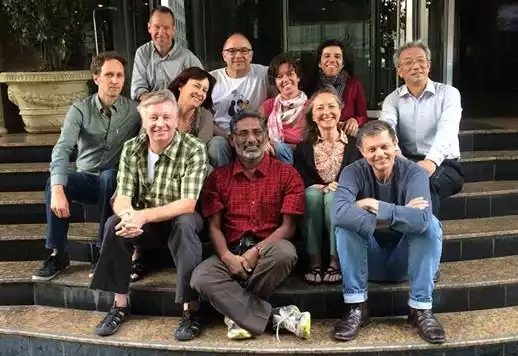
President: Andre Leu (Australia)
Vice Presidents: Manjo Smith (Namibia), Frank Eyhorn (Switzerland)
Eva Torremocha (Spain), Gabi Soto (Costa Rica), Mathew John (India), Peggy Miars (USA), Gerold Rahmann (Germany), Roberto Ugas (Peru), Zeijang Zhou (China).
New NOA board elected
2015-11-17
New NOA board elected
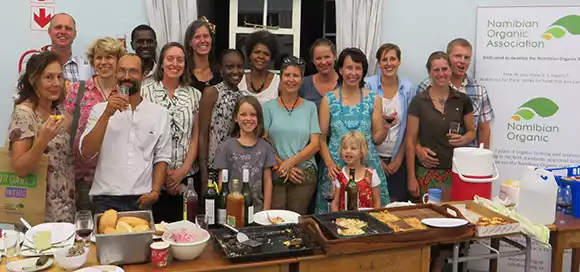
A BIG thank you to all NOA members and guests who attended the NOA AGM on 13 November. The following members serve on the new NOA Board: Manjo Smith (Chairperson), Judith Isele (Vice-chair), Ina Cramer, John Mafukidze, Stephen Barrow, Nathanael Shikongo and Moritz von Hase.
NOA participates in FAO sustainability study
NOA participates in FAO sustainability study
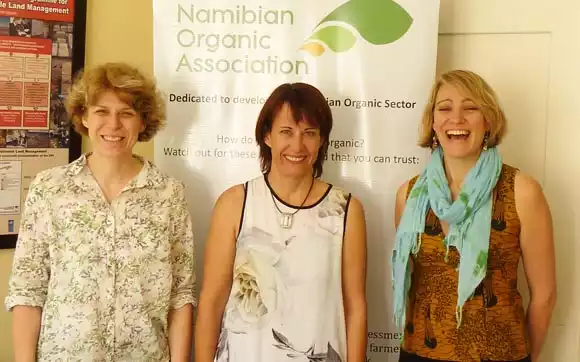
FLTR: Edith Kalka and Manjo Smith of NOA, and Allison Loconto of the FAO, meeting in Windhoek to discuss the study.
Ensuring sustainability from ‘farm to fork’ is a measure that enhances food security as it enables the provision of nutritious foods produced without degrading the environment. The issue of sustainability is paramount as the world grapples and tries to balance between producing enough food for everyone and at the same time guaranteeing that future generations enjoy a safe environment. This trend has seen an intense focus on the production and consumption of organic food.
There are incentives that motivate farmers to adopt more sustainable practices, one of them being markets, which could play an important role in the transition towards sustainable intensification. Policy pressures to propose ‘climate-smart’ agricultural solutions and the rise of consumer demand for “sustainable” products (including organic, fair trade, ‘green’ labels) have created market outlets for sustainable food, textiles and energy in developed countries.
In Namibia, markets for organic and other sustainably produced products are gaining attention internationally thanks to a study undertaken by the Food and Agriculture Organization of the United Nations (FAO), the French National Institute for Agricultural Research (INRA) and the Namibian Organic Association (NOA).
“This study is one of 15 cases selected for publication in a volume that explores how markets can drive the adoption of more sustainable agricultural practices”, said Babagana Ahmadu, FAO representative in Namibia. The book is a result of a survey that explores innovative approaches (public, private and civil society) designed to link sustainable crop production practices in local markets for sustainable products in developing countries in Africa, Asia and Latin America.
Linking sustainable production and consumption
Linking sustainable production and consumption through efficient and inclusive food value chains is one of the strategic priorities of FAO. This approach clearly converges with the objectives of the Namibian National Agricultural Policy (MAWF, 1995), which among other priorities, aims to promote the sustainable utilization of the nation’s land and other natural resources.
Through NOA’s participatory guarantee system (PGS) of certification for organic products, Namibia has been able to ensure that the market drives the adoption of sustainable agricultural products. The PGS brings consumers, producers and other intermediaries together on a regular basis to conduct ‘peer-reviews’ of organic farms. The system relies upon the expert knowledge of farmers to assess farming practices and the interest of consumers and intermediaries to participate and observe these assessments. The system also relies heavily upon direct marketing through members of the network, the weekly Windhoek Greenmarket and through Internet orders for the Organic Box.
FAO and NOA interactions with a number of organic producers, processors and traders showed that there is a demand for Namibian-made organic and sustainably produced food, but greater support is needed to set up the institutional supports that can make this food more easily accessible (in terms of sufficient supply, retail outlets and competitive prices) to all types of consumers across the country.
NOA Chairwoman elected IFOAM Vice President
NOA Chairwoman elected IFOAM Vice President
Namibian organic farmer Manjo Smith of Green Spot Organics in Okahandja has been elected Vice President of the International Federation of Organic Agriculture Movements (IFOAM) at the organisations’ General Assembly that convened on 16-17 October 2014 in Istanbul, Turkey. Smith has served as IFOAM World Board Member since 2011. She is a founder member of the Namibian Organics Association and has held the position of Chairperson of the the past 5 years. She also serves as Chairperson of the National Association of Horticultural Producers (NAHOP), which represents horticultural farmers across Namibia. A tireless champion for organic food production, Smith formed part of a team that spearheaded the very first Sustainable Ecological Crop and Horticulture Conference held in Okahandja for large scale commercial producers and in Rundu for small scale horticulture producers in August of 2013.
As Vice President of IFOAM, her task will be to support the development of organic agricultural practices and policy on a global scale. Commenting on her new role as Vice President, Smith said, “I am very honoured and privileged to serve the international organic sector. The most important aspect in serving in this role is to drive the development of broad-based knowledge of organic farming at an institutional level, and then to implement modern, innovative and scientific organic farming methods at a production level” she adds.
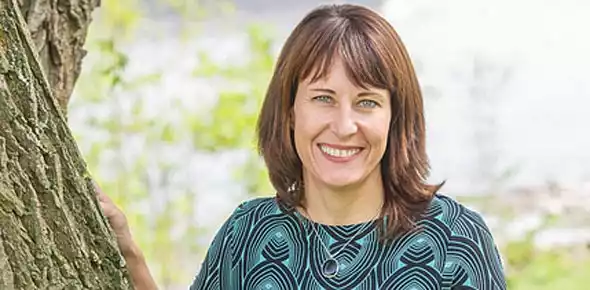
According to the latest global statistics, there are 1.9 million certified organic farmers in 164 countries producing food on 37.5 million hectares of land. The global market for organic food is worth 63.8 billion US dollars and the global trend remains positive with a constant consumer demand increase. “In Namibia, this international trend of demand outstripping supply is evident,” says Smith, “households are looking for healthier and more sustainable options, especially in the light of serious questions being raised regarding contribution of the environmental degradation of conventional farming, the health hazards presented with the use of pesticides, herbicides and the use of genetically-modified organisms or GMOs,” she says.
Building the case for organic practice, she goes on to say, “In addition to producing food responsibly and sustainably, organic agriculture holds solutions for conserving and restoring our natural resources. It is the core around which sustainable agriculture can be built, stable human societies can be secured, and healthy ecological systems can be maintained. Organic farming offers one of the best solutions to the negative impact of climate change, and this agricultural approach is critical to Namibia’s vision for sustainable agriculture and food security,” she argues.
Smith concluded by saying that although organic agriculture can promote food security on a local and regional level, further development of food processing operations, using local produce, will assist with contributing toward food security on a national and intra-regional level.
During IFOAM’s 2014 General Assembly, a total of 17 international candidates stood for election for the 10 places on the IFOAM World Board for the tenure 2014 -2017. The results are as follows:
President: Andre Leu (Australia)
Vice Presidents: Manjo Smith (Namibia), Frank Eyhorn (Switzerland)
Eva Torremocha (Spain), Gabi Soto (Costa Rica), Mathew John (India),
Peggy Miars (USA), Gerold Rahmann (Germany), Roberto Ugas (Peru), Zeijang
Zhou (China)
IFOAM is the only international umbrella organization for the organic world, uniting close to 800 Affiliates in 118 countries. The organisation actively participates in international agricultural and environmental negotiations with the United Nations, FAO and other multilateral institutions to further the interests of the organic agricultural movement worldwide. One of IFOAM’s main aims is the worldwide adoption of ecologically, socially and economically sound systems that are based on the principles of organic agriculture.
NOA performs farm assessments
NOA performs farm assessments
The NOA PGS Team assessed Farm Olifantwater West (near Blumfelde) early March 2021 and Farm Krumhuk (near Windhoek) end of March 2021 against the NOA standards.
Thank you to all farmers and gardeners for their transparency and hospitality and to all NOA members and interested farmers who joined the assessments as observers! We had a very lively and interesting exchange with all participants who enjoyed the assessments while learning a lot about organics.
2020
NOA performs farm assessments
In October 2020, the NOA PGS Team assessed Farm Bellissima (Okahandja) and Farm Gottesgabe (near Witvlei) against the NOA standards.
Thank you to all farmers and gardeners for their transparency and hospitality and to all NOA members and interested farmers who joined the assessments as observers! We had a very lively and interesting exchange with all participants who enjoyed the assessments while learning a lot about organics.
The NOA PGS Team assessed Farm Springbockvley and Farm Olifantwater West (near Blumfelde), Farm Krumhuk (near Windhoek) and the vegetable garden of Wolwedans (NamibRand Nature Reserve) against the NOA standards.
Thank you to all farmers and gardeners for their transparency and hospitality and to all NOA members and interested farmers who joined the assessments as observers! We had a very lively and interesting exchange with all participants who enjoyed the assessments while learning a lot about organics.
What we assessed
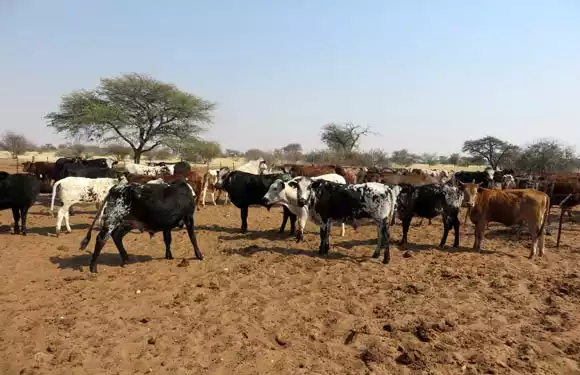
At Farm Springbocklvey, NOA assessed Nguni cattle and Damara sheep.
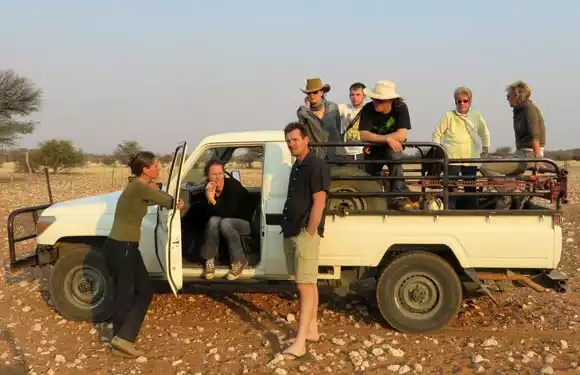
At Farm Olifantwater West, NOA assessed Nguni, Afrikaner and Bonsmara cattle, Damara and Swakara sheep.
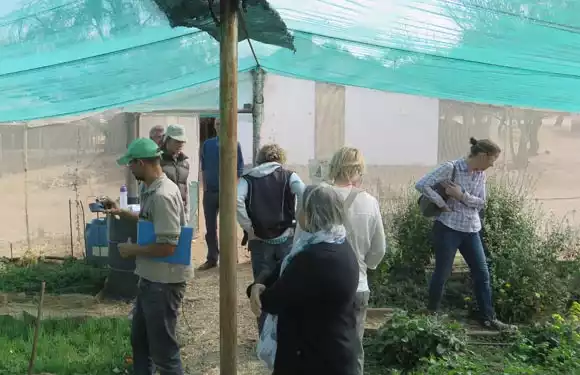
At Farm Krumhuk, NOA assessed beef and dairy cattle, vegetables, herbs and fruits
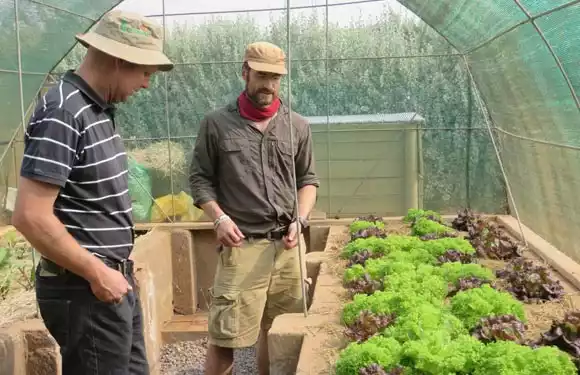
NOA assessed vegetables, fruit and herbs at Wolwedans.
The Namibian Organic Association assesses Namibian farms according to IFOAM’s Participatory Guarantee Systems (PGS). It is a locally focused organic assurance system for Namibian organic produce which provides a credible and cost effective mechanism through which producers can provide an organic guarantee to consumers.
It is based on a transparent, formal, and systemized decision making process, and NOA members are invited to participate in this process as observers.
Find out more about NOA assessments here...
Namibians attend 18th IFOAM World Congress, Turkey
18th IFOAM World Congress, Turkey
The 18th IFOAM World Congress was held on 13 - 15 October in Istanbul, Turkey.
The IFOAM World Congress takes place every three years, and this year’s event was attended by 900 guests from 81 nations. Manjo Smith, Judith Isele and Natanial Shikongo from the Namibian Organic Association represented Namibia at this premier international event.
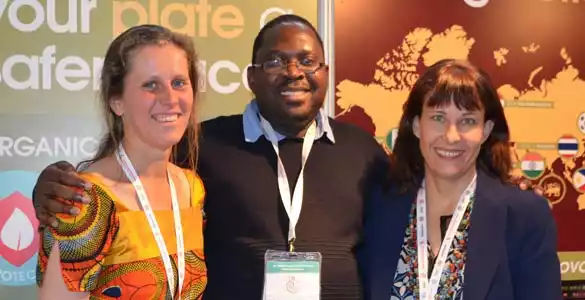
Above: Judith Isele, Natanial Shikongo and Manjo Smith of the Namibian Organic Association at the Organic World Congress.
With roughly 80 individual events, the programme offered everyone with an interest in organic agriculture, marketing and research myriad opportunities to access and exchange information. The emphasis was specifically on themes to do with plant and animal production. The legal framework conditions, controls in organic farming, the trade, organic consumers and the organization of producers were also discussed.
Many speakers brought home the messages of what is needed to make the world a more organic and sustainable place. The former Deputy American Minister of Agriculture, Kathleen Merrigan, pointed out the importance of building bridges saying, ‘The big bridge we have to build is to the next generation.’
FAO representative Nadia El-Hage Scialabba, reminded the audience that it’s the Year of Family Farming, and emphasized that there was still much urgent work to be done in order to guarantee food security. She stressed that the FAO is already working closely with to create global cooperation for the benefit of organic farming.
The calls for putting theory into practice came from many and were supported by Lyonpo Yeshey Dorji, the Bhutanese Minister of Agriculture who reiterated the country's commitment to going 100% organic by 2020.
The congress closed with Markus Arbenz, IFOAM Executive Director, expressing the urgent need to enable access for people the world over to ‘healthy, nutritious, organic food.’
India will host the 19th Organic World Congress during 2017.
IFOAM - Training of Teams of Trainers (ToToT) 2021
2021
IFOAM – Organics International with the Sustainability Institute did a 5 days Training of Teams of Trainers, the ToToT.
A group of about 17 people from across Namibia participated in the 5-day Training of Teams of Trainers (ToToT) that was held from 11-15 January 2021, Rundu, Namibia. These trainings were conducted as part of the Knowledge Centre for Organic Agriculture in Africa (KCOA) in partnership with the Namibian Organic Association (NOA). The ToToT aims to address Capacity Development Processes for Ecological Organic Agriculture in Africa at Continental and National Level.
"Knowledge on organic farming principles is still very limited in Namibia. This training was a great opportunity to facilitate the participants with technical knowledge as well as the training skills to act as multipliers of this content. The networking between the participants, who came from very different regions of this vast country was highly appreciated by all." Mareike Aufderheide-Voigts
NOA Board Member and Namibian Project Manager of Knowledge Hub for Organic Agriculture in Southern Africa
2015
NOA members attend Organic Urban Agri Workshop
Twelve NOA members recently attended a 4-day Organic Urban Agriculture Training Workshop in Cape Town. The training was offered by Abalimi Bezekhaya, an NGO working to empower the disadvantaged through urban agriculture projects in the informal settlements around Cape Town. 
Above: NOA members receive training in urban agriculture.
Urban food security in Namibia is a challenge, and it is important to develop the skills and capacity of urban dwellers since more and more people are moving to cities. NOA is receiving increased requests for knowledge sharing and capacity building on the topic of organic agricultural production.
NOA is very grateful for the sponsorship by Tony Pupkewitz which made this capacity building exercise possible.
"In order to increase food security in the informal settlements, people can learn to produce some of their own food in the city," says Manjo Smith, NOA Chairperson. "Many people have access to a little bit of land, and with innovative water usage methods, it is possible to produce some vegetables."
“We realised that we need to put a competent team together that can ultimately offer local training and support to urban agricultural projects, small scale farming projects as well as large scale commercial organic farming projects. This is our first step in this direction, and we are very excited with all the knowledge and practical experienced that we have gained,” says Manjo Smith.
The training course was very extensive, and training topics included planning of an urban garden, production of seedlings, soil fertility management, crop rotation, companion planting, plant nutrition, building compost heaps, applying mulching, preparing liquid manures, pest and disease control.
Above: the NOA members received certificates after their training.
"Abalimi Bezekhaya offered us a perfect opportunity of theoretical training, practical training as well as site visits and engagement with the urban agricultural community projects on the Cape Flats," says John Mafukidze and Patricia Sola-Mafukidze, founders of the Hope Initiatives Namibia (HISA).
HISA is a community based project in Katutura which focuses on supporting the community that are generally food insecure to grow home gardens. They also work with local Primary School teachers and Kindergartens teachers.
As a member of NOA, HISA endeavours to educate the community it serves to care for vulnerable children and offer training that will benefit the community by showing a functional model of a Community Organic Horticultural project that brings food security to individual households, incomes for breadwinners who if they have any debilitating disease can still get participation of family members in urban and peri-urban informal settlements.
The Abalimi project is a good model that taught us how sustainability for community based organisation such as HISA, can help the people to improve their lives. It’s a Win – Win situation, and the project has the potential to reduce household poverty, create jobs for informal dwellers, improve the situation of household food insecurity, enrich peri -urban informal settlements with food supply and consumption of organically grown vegetables to sell and make a living. For a community based organisation such as HISA, this was our AHA! Moment at Abalimi centre and many other places we visited such as the Skye Organic Farm, Khayelitsha Garden Centre, Moya We Khaya Garden and Bambanani garden.
"The lessons learnt from the experiences of Abalimi on how to turn social gardens into Market Gardens that will ensure sustainability was an eye opener for our Organic Project in Namibia. We plan to adopt this practical model and contextualise it for the community, primary schools and kindergartens within the Namibian environment in the near future. HISA will strengthen its training programme with local primary schools and include the systemic teaching of Basic Organic Horticulture for the urban market as well as pioneer the production of seedlings for Organic market and own consumption," says John Mafukidze.
Martha Nataniel’s highlight on the course was to see the high production in the city vegetable gardens, and how the community sell the produce and earn an income. “The community members involved in the respective gardens are responsible for their own piece of land, which includes the soil preparation, planting, weeding, harvesting and selling. A percentage of each member’s profit is then put into the “pot” to cover the cost of irrigation. This helps them improve their own conditions”.
Urban agricultural is a global and growing pursuit that can contribute to job creation, economic development, food security, community building and the social inclusion of the urban poor and women. Furthermore, it helps with the greening of the city and the productive re-use of city wastes.
"In a country with very limited resources, it is important to explore the various opportunities of turning waste into resources, which can ultimately be used to produce food for ourselves – so the entire city can become a farm", concludes Manjo Smith.
New organic mark for Namibia
New organic mark for Namibia

NOA has launched a new mark to recognise Namibia’s organic farmers who are producing food according the organic production standards, but are not yet compliant with the processing standards. This means that the actual ingredients are organically certified, but the processing procedures and facilities are not yet compliant. Producers are encouraged to upgrade their facilities accordingly by 2016.
The new mark (above) will show which ingredients are produced organically in Namibia by marking them with an asterisk (*).
By purchasing products that contain locally produced organic ingredients, you are also supporting the growing local organic agriculture sector. Please buy lots.
Roadshow to the central north
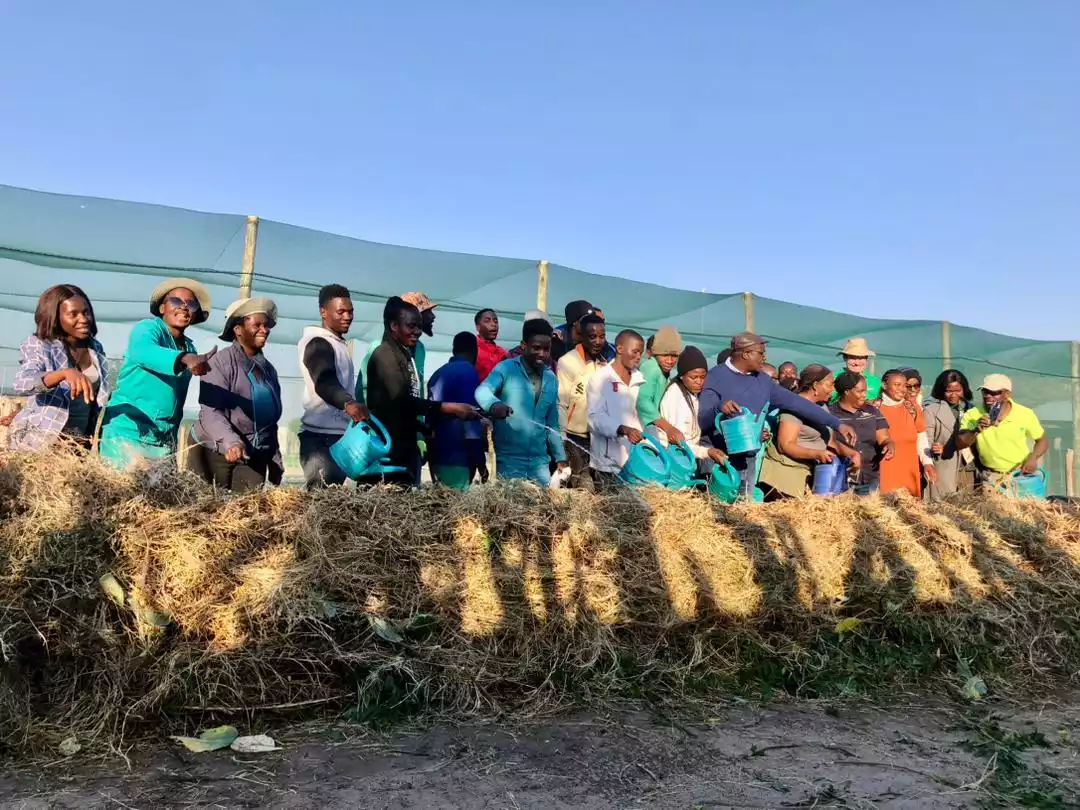
The Namibia Organic Association conducted four trainings on "Enhancing Productivity through Organic Farming Principles" in the Central Northern Regions of Ohangwena, Oshana, Omusati, and Oshikoto from July 19 to 22. Close to 90 people from various ages and backgrounds attended the workshops. The programme sought to promote organic agriculture practices as effective means of improving soil fertility and preparing for longer drought spells. Among the topics covered in theory and practice were aerobic composting, climate-smart land management, the formulation of alternative animal feed and nutrition, organic certification under PGS (the Participatory Guarantee System), seed saving, and basic fruit tree cultivation. The trainings were financially supported by a generous donation from Mr. Tony Pupkewitz.
NOA at workshop on biosafety regulations
NOA at workshop on biosafety regulations

Manjo Krige-Smith, Chairperson of the Namibia Organic Association (NOA) recently participated on behalf the Namibian organic sector in a workshop on draft bio-safety regulations. The workshop was held by the National Commission on Research, Science and Technology (NCRST) in Windhoek on 3 November 2014.
The workshop will refine Namibian regulations for safe transfer, handling and use of living GMOs. The regulations will cover conservation and sustainable use of biological diversity and risks to human health, as required under the Cartagena Protocol on Biosafety to the Convention on Biological Diversity.
The regulations will be gazetted by the Ministry of Justice, as provided by the Biosafety Act , 2006 (Act No. 7 of 2006).



